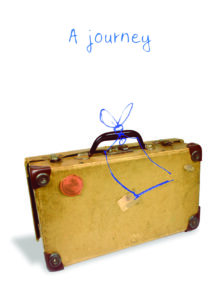Cate Kennedy’s foreword for Storycatching (Innovative Resources, 2008) may have just turned 16, but it’s still one of the most beautiful pieces of writing about the shared experience of storytelling you’ll ever read.
When Cate references the influence of TV, you realise this resource pre-dates the smart phone (as we now know it), but the cards’ quirky, retro designs haven’t aged a bit. They’re still sparking transformative conversations and stories about the joys and struggles of life … in the classroom, in therapeutic settings, and anywhere people want to reflect upon feelings, memories and attitudes to life.
Just as some people are born with a fine ear for music or the ability to kick a football straight every time, some people seem born with a knack for recognising a good story when they hear one. They know how to remember its important ingredients in the right order so they can tell it for themselves. They sift through their own experiences knowing which ones are worth passing on. I use the word ‘worth’ cautiously because I see people’s inherent nagging doubt that their experiences are worth anything as part of the problem. ‘Nothing interesting ever happens to me,’ they will say, or ‘I’ve got nothing worth telling a story about.’
 Yet what breathes life into a story is the storyteller’s faith in its power. It is their total conviction which makes us sit still and pay attention, and find something in what we’re being told which touches a chord deep inside us. I love it when someone says of a story: ‘That was pretty close to the bone,’ or ‘That cut really deep.’ A story which hits on something true gets us deeply inside, right down near the bones. And sometimes that recognition comes with a grimace of pain or a lump in the throat.
Yet what breathes life into a story is the storyteller’s faith in its power. It is their total conviction which makes us sit still and pay attention, and find something in what we’re being told which touches a chord deep inside us. I love it when someone says of a story: ‘That was pretty close to the bone,’ or ‘That cut really deep.’ A story which hits on something true gets us deeply inside, right down near the bones. And sometimes that recognition comes with a grimace of pain or a lump in the throat.
I heard two stories recently that have stayed with me. One was told to me by an 85-year-old man. In the course of a casual conversation he described how he remembers, from his childhood, a woman who lived on a neighbouring farm. The men were often away for days at a time, and during one of these lonely periods her fire went out. She walked eleven miles to a neighbour’s farm for a match and then walked home again.
I’ve been thinking about this story, planted in my subconscious, uncurling and growing like a vine. Compulsively, almost helplessly, I have been filling in the blanks. How did she feel when she realised her hearth was cold, and what she needed to do? What clothes did she pull on and what did she take with her for that long walk? And when she arrived, did she feel an aching longing to stay at her neighbour’s house, resting in their company rather than face the solitary desolation of that long trek home again to a cold and empty house? I imagine they gave her more than one match, and I imagine her clutching those matches in her pocket for comfort.
I circle around the story, wondering about the hold it has on me. I begin to see the underside of it, like the stitches in a garment, the terrible loneliness of pioneer women, their heartrending stoicism, their hardship. I wonder if I can make something out of it, something else, to touch your heart with.
I heard another story in a documentary, told by a Jewish survivor of Auschwitz. After the war he had returned to his former family house in Germany and knocked on the door. The German occupant admitted him uneasily, well aware that he was surrounded by the Jewish man’s family possessions.
‘I know why you’ve come back,’ he said finally to the Jewish man. ‘You hid money in this house, didn’t you? Now you’ve come to take it.’ No, the Jewish man had said, his family had no money to hide. The German didn’t believe him. ‘Go and get it,’ he insisted, ‘and you and I can go fifty-fifty.’
At that, the Jewish man had turned and left the house without saying anything more. The next time he visited the town he went to the house again and found it an uninhabitable wreck. Walls were knocked out, plaster had been torn off, floorboards pulled up. He spoke to the neighbours. ‘After you left,’ they said, ‘he couldn’t sleep. He couldn’t believe there wasn’t a fortune hidden somewhere. He tore the house apart looking for it. It sent him broke. He couldn’t afford to repair anything so he left and we’ve never seen him since.’
Here, lifted from reality, is a fable so perfect it could be told to us by Aesop, or Scheherazade, or Jesus. Like all great fables there’s no need to provide a moral—the story just sings with its own simple truths about theft and treasure and guilt. How can we not tuck it away in our pockets, and use it to light a fire somewhere, to keep our listeners warm?
I like the idea of a story being like a fire. It gives me heart to imagine tribes of humans sitting around fires telling stories, different voices speaking up with their own contributions. One memory provokes another, one joke triggers a fresh one, and on it goes until the fire dies down and we are left basking in the warmth of our circle.
Somewhere over the last couple of hundred years we have forgotten the power of this simple, crucial connection. Our hearth is now the flickering blue light of the TV set in the corner, which never lets us interrupt and contribute something of our own; which never stops and lets us contemplate, and which usually isn’t even reflecting a life or culture which is recognisably our own.
I love the stories best that have been passed down from fire to fire, through generations, very often without being written down for hundreds of years. You know those ones are going to cut right to the bone somehow, because thousands of people have listened to them, remembered them and thought they were worth retelling. Like songs that work in the same way, those stories are going to have a chorus worth singing.
That’s where the ideas come from—the well of emotion that fills from inside, the small painful memory that won’t let go, the tale that made me nod my head that I will carry with me like a talisman, ready to pass it on to you in the same spirit. Far from being worthless, it seems to me, more and more, that these are the only human legacies worth anything at all.
Maybe people have forgotten that what they’re carrying is the very thing they need—the urge to share what happens to them. We tear down walls looking for hidden wealth, when we had it in our pockets all the time.
Here is a pack of cards for you—each of them a tantalising path into a place worth exploring. Shuffle through them slowly, or spread them on the floor around you. So many doors asking to be knocked on! Light a bonfire in your listener’s imagination with them, listen in return, and be reminded of something else worth telling and retelling. Amazing but true—you’ll remember more. You’ll find laughter you’ve forgotten and tears you haven’t shed. Pick out another card and see where it takes you.
I don’t know you yet, but tell me a story and I can start. Those voices you can hear around the fire—as people pick up those threads and smile with recognition, understanding and a kind of relief—those voices are what make us human. That circle is all we have—our whole past and future is tied up in there. Hold onto it. Hold everything you want to share like cards in your hand, because soon it will be your turn.
 Cate Kennedy is an award-winning author who has published two short story collections, a novel, three poetry collections, and a memoir. Her stories have appeared in many publications including The New Yorker, the Harvard Literary Review, World Literature Today . Cate is the recipient of the Queensland Literary Award for her collection, Like a House on Fire, and the Victorian Premier’s Literary Award for her poetry collection, The Taste of River Water. Her novel, The World Beneath, was awarded the People’s Choice prize in the NSW Literary awards and has been translated into French and Mandarin.
Cate Kennedy is an award-winning author who has published two short story collections, a novel, three poetry collections, and a memoir. Her stories have appeared in many publications including The New Yorker, the Harvard Literary Review, World Literature Today . Cate is the recipient of the Queensland Literary Award for her collection, Like a House on Fire, and the Victorian Premier’s Literary Award for her poetry collection, The Taste of River Water. Her novel, The World Beneath, was awarded the People’s Choice prize in the NSW Literary awards and has been translated into French and Mandarin.

